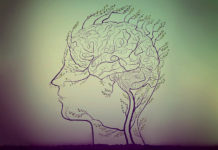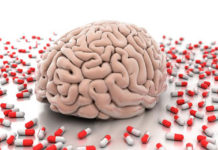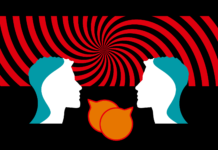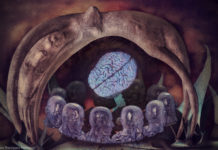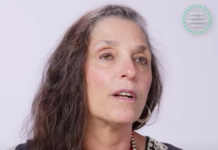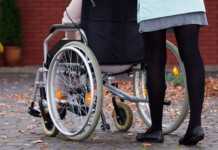Healing From Schizophrenia
My experience is that living in a psychosis forces your brain to "stretch" — you develop extra capacity to handle things. I was pretty much living a normal life, even working some of the time, while having all of my psychotic problems. After the psychoses faded away, I no longer needed to fight monsters, but I still had that extra capacity left. After 11 periods of psychosis, my brain has never worked as well as it does now.
“Diagnostic Dissent”: Experiences of Individuals Who Disagreed With Their Diagnosis
Researchers investigate the first-person experiences of people who disagreed with their psychiatric diagnosis of psychosis.
Social Adversity and Crime Victimization Increase Risk of Psychotic Experiences Five Fold
Researchers parse out factors within urbanicity that leads to risk for psychotic experiences.
New Research Suggests Brain Abnormalities in ‘Schizophrenia’ May Result From Antipsychotics
Study finds that reduced cortical thickness and brain surface area associated with 'schizophrenia' may result from antipsychotic drug use.
FDA Defends Decision to Approve Digital Aripiprazole
Members of the U.S. Food and Drug Administration’s Psychiatry Products division go on the defensive in a new article, responding to concerns about the agency’s approval of digital aripiprazole.
Early Attention to Life Circumstances and Relationships Improves Outcomes for Psychosis
Coordinated care with employment support and family therapy leads to superior outcomes for those diagnosed with psychotic disorders.
Is Psychosis Natural?
Much of the wild world is now a garden: a rational, controlled space. Yet if we step out of the garden and back into the old growth, I believe the process of psychosis belongs as part of Earth’s “will,” of her wild. The physiological process of psychosis—that of amplified senses—is ecologically purposeful. Not good nor bad, but part of what Nature does trying to grow. Here I share a talk I gave in Boulder, Colorado exploring these themes.
Learning to Speak Psychotic
One of the biggest barriers that people who are “psychotic” face is one of communication: other people often have trouble understanding what they’re talking about. The way they describe their experience and their ideas are simply foreign to most people. This lack of clear communication is what gets them labelled as “psychotic” in the first place, and thus it leads to a breakdown between the “psychotic” and the rest of society. This is a loss to both groups.
Randomized Controlled Trials of Psychiatric Drugs Tell of Harm Done
The most important data in an RCT is not whether the drug provides a statistically significant benefit over placebo. The most important data is the “number needed to treat” calculation (NNT). For the person considering taking an antidepressant or an antipsychotic, the NNT data provides the “math” needed to weigh the potential benefit of taking the drug against the potential harm of doing so.
Researchers Explore Sexuality and Gender in the Context of Psychosis
Nev Jones and a team of researchers examine how sex, sexuality, and gender-related content are underexplored in contemporary research on psychosis.
Does My Algorithm Have a Mental Health Problem?
From Big Think: As our algorithms are increasingly being made in our own image, they are at heightened risk of experiencing "mental health problems."
"Take the...
How to Talk to Somebody Who is Hearing Voices
In this piece for MetroUK, Lucy Nichol explains how to best support people in "psychosis," emphasizing the need to believe individuals who hear voices and recognize...
Mental Health Industry Should Embrace Choices Beyond Drugs
In this video for NowThis, Yana Jacobs critiques the mental health industry standard of prescribing drugs as the first-line treatment for "mental illness." She emphasizes...
“25 Years of Madness and Modernism”: A Review
In this piece for the Centre for Medical Humanities, James Whitehead reflects on the 25th anniversary celebration of the publication of Louis Sass's Madness and Modernism.
"A...
The Sound of Madness
From Harper's Magazine: People who hear positive, encouraging voices often seen as spiritual guides or messages and people diagnosed with schizophrenia are usually thought of as...
Distinguishing Dissociative Disorders from Psychotic Disorders: Compounding Alienation
If a person recognizes the “alien” parts of themselves as being parts of themselves, they are likely to be seen as having PTSD or a dissociative disorder. If they see the “alien” parts of themselves as being literally aliens, or demons, they will likely be diagnosed as psychotic. But these experiences are really on a spectrum.
Minority Groups Found Less Likely to Get Mental Health Care
From California Healthline: Although people of color are much more likely to suffer from severe psychological distress, they are less likely to receive mental health...
The Shamanic View of Mental Illness
From UPLIFT: In the shamanic view, emotional distress and psychosis signal a spiritual awakening or emergence, not a pathology. Western cultures can learn a great...
The Enduring Myth of the Mad Genius
From Wellcome Collection: It has long been assumed that great writers and artists must be touched by madness. However, no link between artistic talent and...
Temperamentally Blessed
From Aeon: The finding that only one in five people avoid any kind of mental health problems or psychiatric diagnoses through their lives has prompted...
The Never-Ending Misuse of Antipsychotics in Nursing Homes
From Health Affairs: Although the problem of antipsychotic misuse in nursing homes has been raised to policymakers numerous times over the past six decades, the...
What Care for the Criminally Insane Can Teach Us
In this piece for The Pew Charitable Trusts, Michael Ollove reports on Oregon's model of intense care and supervision for those found guilty except for insanity.
"Oregon’s model...
A Commentary on the Finnish Analysis of Outcomes of First Episode Schizophrenia
There are a number of well-recognised problems with this sort of study and we should be very cautious about accepting its conclusions at face value. The main problem is that it is an ‘observational’ study, not a randomised controlled trial, and these analyses can be seriously misleading.
20-year Outcomes for First-episode Psychosis: Impact of Neuroleptic Drug Discontinuation
The authors conclude that the risk of treatment failure or relapse after discontinuation of antipsychotics does not decrease during the first eight years of illness, and that long-term antipsychotic treatment is associated with increased survival. This is a sobering finding and the paper warrants careful review.
Researchers Explore the Relationship Between Religiosity and Psychotic Experiences
Individuals who identify as religious may be more likely to have symptoms associated with psychosis.

